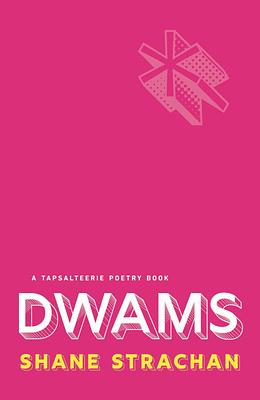Looking for all Articles by Shane Strachan?
The music in oor vyces: The impact of the Scots Language Publication Grant

As far as I can remember, during my whole time at school in Fraserburgh, from 1993 to 2006, we never read anything in Scots in class. Aside from those few bairns that took part in an optional Burns recital in primary, or the one quine who was taught bothy ballads by her family and allowed to sing them at the annual secondary school concert, there was no exposure to Doric (North East Scots) inside school except for when it slipped out of our own mouths and we were promptly told to repeat ourselves in English. Then the bell would ring and we'd heid ootside tae play wi the ither bairns in the playgroon, or ging back hame tae oor hooses far we'd spik awa tae faimly, maist o us oblivious tae the music in oor vyces, nae realisin hoo special it wis tae hae this hale warld o ither wirds and wyes o thinkin.
This distinct separation and hierarchy between a language of school and a language of home fostered a lack of pride in our mother tongue, which then fed into various anxieties folk in my hometown had around how we spoke, eating away at our sense of self and our self-esteem. In public speaking contexts or on camera in the media, you especially couldn't win: if you spoke in English, ye surely thoucht yersel above aabody else; if ye spoke in Scots, then ye were aften mocked or cringed at fir soondin uneducated by yer ain folk fa spoke the same wye, never mind fit ony non-Scots spikkers had tae say. . .
Realising there were contemporary writers who wrote in Scots was therefore a slow journey for me. The first revelation came thanks to Scottish Book Trust funding authors like Janet Paisley and Alan Bissett to visit secondary school pupils across Aberdeenshire as part of WriteFest, which has been going now for almost twenty years. Paisley, a fine writer of Scots who sadly passed in 2018, asked us to write down things our parents said when they gave us into trouble and then arrange them into a poem based on increasing tension, and voila – ma first Doric poyem!
Going on to study English Literature at the University of Aberdeen changed things once more. Being exposed to writers like Lewis Grassic Gibbon, Nan Shepherd, Tom Leonard and James Kelman opened up my eyes to the literary potential of Scots, and from there, I began to take writing stories in Doric very seriously. Getting them published, however, was another story. . . While literary magazines in both Scotland and England were welcoming of my work, getting a novel in front of agents and publishers was a higher hill to climb, and when I finally got there, it was something of a shock to find that established Scottish publishers were particularly wary of Scots and dismissive of there being a market for it, while London-based publishers were more receptive, praising the use of Doric for its 'freshness' and 'uniqueness', but ultimately fearful they wouldn't be able to convince their colleagues to take the risk at acquisitions stage.
This was a few years before Scottish Book Trust launched the Scots Language Publication Grant in 2019, funded by the Scottish Government. The grant has been instrumental in supporting the likes of Itchy Coo (spearheaded by writers James Robertson and Matthew Fitt) to continue to produce more high-quality Scots translations for young readers, adding to the wheen of Scots publications that are now being used in schools across the country aided by the government's increased interest in Scots language policy in recent years and the 2011 census which reported around 1.5 million speakers of Scots across the country.
Changing attitudes towards Scots among teachers has also led to the development of an SQA-recognised qualification – the Scots Language Award – with Claire Needler's research at Banff Academy exploring how engaging with Scots in school can improve pupils' attainment, self-esteem and confidence across the curriculum. It's been somewhat surreal to be invited back to the Fraserburgh schools I attended to celebrate Doric with today's pupils: it feels like a whole other world seeing pupils' linguistic identities now celebrated when several decades before some of my family would have been strapped wi the towse fir spikkin Doric. To hold the post of the National Library of Scotland's Scots Scriever (another initiative driven by Scots language policy) has also been surreal, especially when I spoke Scots live on the BBC while presenting the 'Janet Paisley Services to Scots Award' to Anne Donovan at the Scots Trad Music Awards last year – fit rare!
The promotion and celebration of Scots in schools and in the media is leading to a burgeoning readership, with secondary teachers calling for more advanced works in Scots for teens, alongside the existing audience of adult Scots speakers and the increasing number of adults learning the leid for the first time through H.E. and community education. The Scots Language Publication Grant has been increasingly meeting that demand by supporting excellent publications such as Harry Josephine Giles' award-winning Deep Wheel Orcadia, Ross Sayers' Daisy on the Outer Line, Ely Percy's Duck Feet, and Thomas Clark's recent translation of Orwell's Animal Farm.
My earlier negative experiences with trying to get my Scots writing published led to me switching focus and creating work primarily for performance settings and for community projects. This opened up doors for me to work with the likes of the National Theatre of Scotland, BBC Radio 4, Grampian Hospitals Art Trust and now the National Library of Scotland. Across time, I've amassed a collection of poetry and spoken-word projects which I'm proud of, but haven't attempted to get in print. It felt very much like changed days then when I was approached directly by Tapsalteerie earlier this year to publish a poetry book, joining their list alongside award-winning poets Stewart Sanderson and Donald Adamson. And then it was a further thrill when we discovered we'd received a 2023 Scots Language Publication Grant to help us publish and promote the book, DWAMS, which will appear in March 2024.

I hope that DWAMS will be a showcase of Scots literature that goes against any remaining negative preconceptions of what writing in Scots is like, particularly of Doric. DWAMS is anything but couthy, nostalgic or sentimental. It is concerned with the climate emergency and just transition, with facing up to rising xenophobia in Scotland, and with queer relationships, as much as it also concerns itself with place, voice and the folk of the North East. It runs the gamut of what it means to write poetry in Scots, from works in braid Doric to a more general Lallans-like Scots, works that slide up and down the Scots-English spectrum, and verbatim poems made up of real voices overheard on the streets of Aberdeen in Doric, English and Polish.
Alangside ither 2023 awardees like Billy Kay, Susi Briggs and Colin Maxwell, I'm fair-tricket that DWAMS is pairt o this spleet new wave o Scots scrievin and look forrit tae fit's still tae come!
Shane Strachan will perform a Scots Scriever showcase at the National Library of Scotland on the Tuesday 12 September with tickets available to book via Eventbrite. DWAMS is available for pre-order on the Tapsalteerie website(this link will open in a new window).